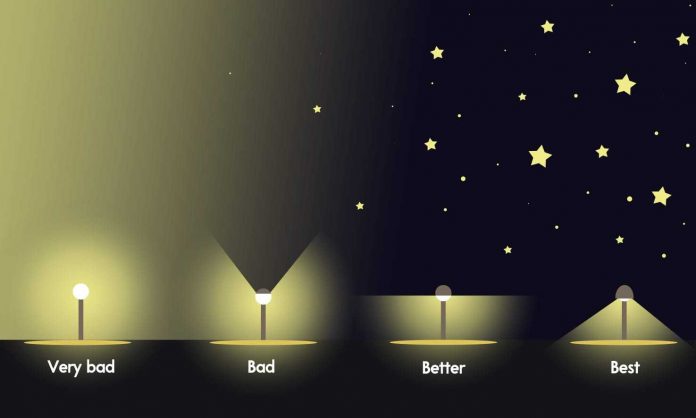Space and Nature Aruba Foundation posted a poll on their Facebook page to find out how well-informed the Aruban community is regarding light pollution and its effects.
A hundred years ago, people could look up and see a spectacular sky brimming with stars. Nowadays, millions of people cannot experience the universe because of light pollution which negatively affects the environment, security, electricity usage, and people’s health.
Excessive or inappropriate use of light, which is known as light pollution, can have grave consequences for human beings and the environment. This includes excessive brightness causing visual discomfort, light in the night sky in inhabited areas, or a light that is situated where it is not needed.
During an interview with our reporter, president of Space and Nature Aruba Foundation, Jairo Vrolijk explained that in 2020 they began consulting with the International Dark-Sky Association, a world foundation established in the United States with the goal of expanding awareness regarding light pollution and promote what they call Dark Sky, which is the dark skies at night, with the main goal of protecting these for the future generations.
“They also certify places, for example parks or common areas for recreation, they can be certified as Dark Sky Park or Dark Sky Place”, according to Vrolijk. He explained that the process to get such certification is very lengthy. At the end of 2021, Vrolijk began working on this process to exchange information and ideas. He said his status within the association changed from Advocate to Delegate, and once his status changed, he came on the world stage of International Dark Sky Association. People can now approach him to get more information on light pollution and he can promote awareness for Dark Sky in Aruba. “But in Aruba, it is not easy. That’s why we want to measure the interest and the knowledge people have on this topic of light pollution”, he said.
There are many aspects of pollution – gas emissions like those emitted by water and energy plant WEB; air pollution like that coming off the dump in Parkietenbos; waste pollution that contaminates even reaching the water in the sea or our drinking water. “But light pollution is still a bit unknown and doesn’t get a priority in our community. There are houses, hotels, buildings that were built without any thought on how they emit certain pollution without our knowledge”, Vrolijk points out.
For this reason they carried out the survey “Impact/Knowledge regarding Light Pollution” on the Facebook Page “Space and Nature Aruba Foundation”, where they reach out to the community to think about light pollution. They ask if the community is willing to adapt the way light is installed, if certain neighborhoods would be willing to modify this and even make the lights less bright during certain hours of the night – or even turn them off entirely.
Vrolijk indicated that they are receiving information from the survey, until Friday, 82 people had completed it. The survey will remain available for at least two more weeks in order to get more responses, so they can continue sharing information and give more practical recommendations so that the community can make changes at home and commercial spaces.
Once they find out from the community if they have heard of light pollution or if they are willing to make changes, the foundation will approach the community through different workshops to explain the impact of light pollution and what can be done about it. They will also give information regarding the local flora and fauna, people’s health, vision and security, how much people can save by installing adequate lighting – and in this they want to reach the tourism sector.
Vrolijk mentioned that Aruba receives tourists from big cities like New York and Amsterdam. These are cities with a high intensity of light where people cannot see a single star in the sky. “They cannot enjoy how beautiful our universe is. And little by little, if we do nothing, Aruba will surely lose this too”, Vrolijk warned.
He says that local tourism can benefit if our visitors can come to Aruba and enjoy what is left of a sky full of stars, that they cannot see at home.
“We will do it in the context of letters. We will enter the community with help of the international association Dark Sky, they have a lot of materials to educate people on how to install lights and what the impact of light is on our flora and fauna. We will distribute this information in the neighborhoods where there is a lot of light intensity to begin creating awareness in people”, he commented.
Vrolijk said that they also have the goal of consulting with government agencies like Department of Nature and Environment, Arikok National Park, Tortuga Aruba Foundation, among others, to see how they can work together to share this information. “Particularly if we want to transform the Arikok National Park, in the sense that we can certify with International Dark Sky Association for it to become a Dark Sky Park. This is a two-to-three year long process, because certain requirements need to be met. But once it is certified, we can begin promoting Aruba worldwide as a country having a place certified as a Dark Sky Park, and then you will attract another branch of tourism to Aruba.”
Vrolijk says that it will be a long road, as some changes in law are necessary the same as regarding sound, but this can be done for light.
Aside from their Facebook page, Space and Nature Aruba Foundation, they have another Facebook page called International Dark Sky Association Aruba. On these two pages they will publish the results of the survey.

















